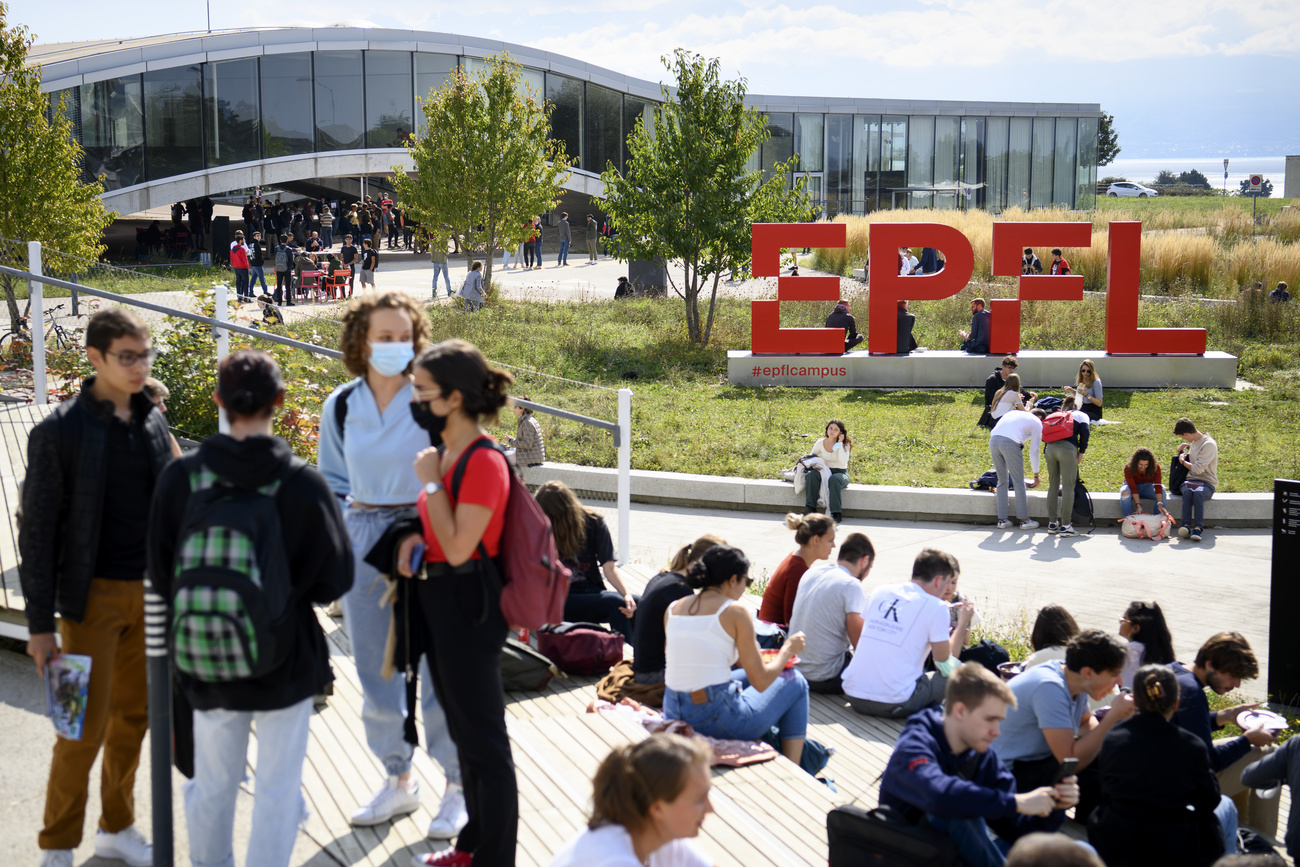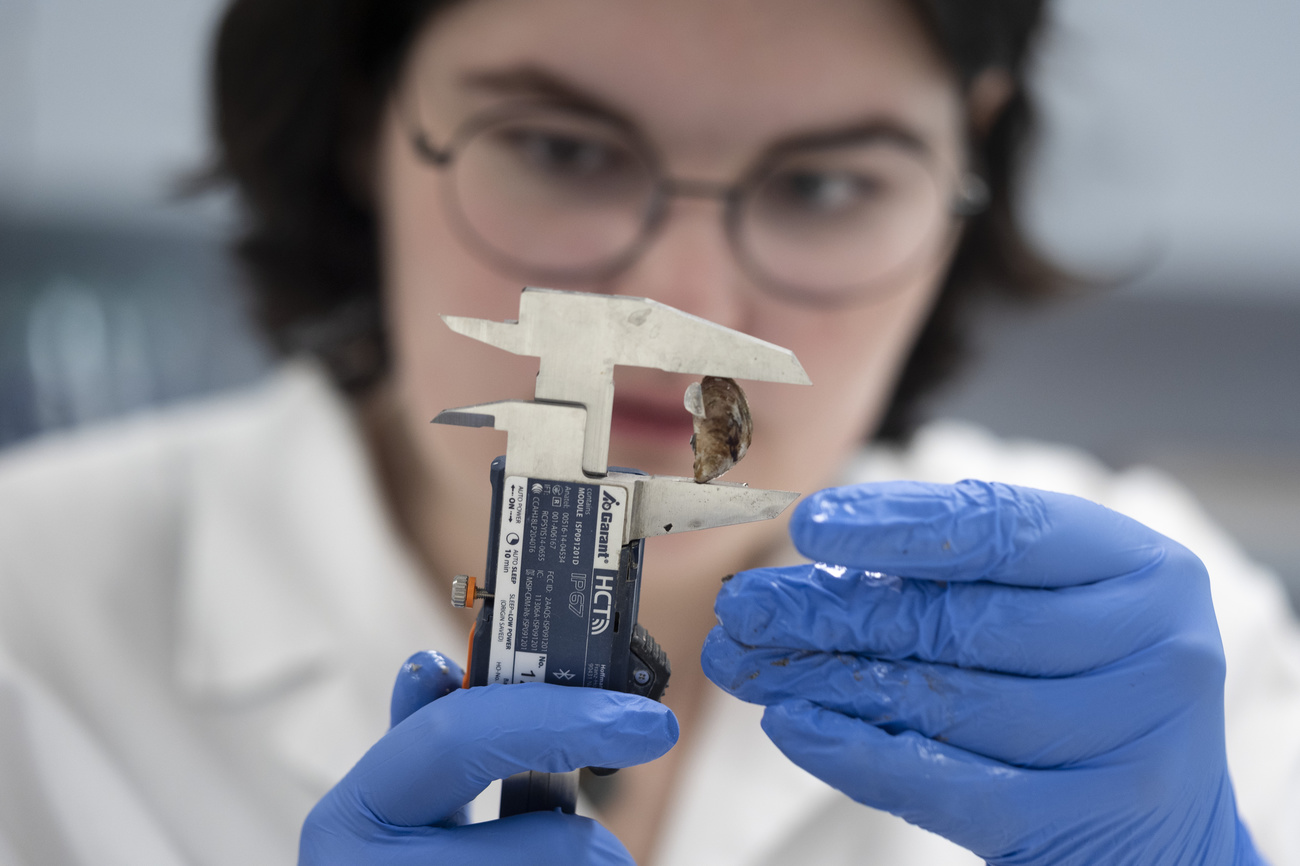A researcher at the Swiss Federal Institute of Aquatic Science and Technology (Eawag) in Dübendorf, near Zurich.
Keystone/Gaetan Bally
Switzerland is often ranked as one of the world’s most innovative and competitive countries, with a reputation for excellence in science and education. But financial pressures have squeezed the upcoming federal education, research and innovation budget. Critics fear the quality of Swiss research and competitiveness will suffer.
Last month the Swiss government announcedExternal link plans to spend a maximum of CHF29.2 billion ($32 billion) over the next three years for Switzerland to “remain an international leader in education, research and innovation”.
This is an increase compared to the federal budget for 2021-2024 (CHF27.8 billion). But Swiss academics and researchers are unhappy. An earlier higher budget proposed for 2025-2028 was slashed by CHF500 million against a backdrop of federal budgetary pressures.
Average annual growth of 2% (in nominal terms) in funding for the education, research and innovation sector has therefore been lowered to 1.6%. Taking into account Swiss inflation forecasts, funding growth in the coming period will more likely be close to zero, say Swiss academics.
Education Minister Guy Parmelin admits the decision to lower the budget has been difficult.
“Taking inflation into account, it will be more difficult for the resources available to meet the needs generated by the increase in the number of participants in all areas of education,” he said on March 8.
Federal money will be used to finance vocational training, adult education, higher education and the promotion of research and innovation. The European Union’s Horizon Europe and Erasmus programmes are not included.
The government strongly believes it can keep Switzerland at the cutting edge in the fields of research and innovation, which is fundamental to its prosperity. The emphasis is on competitive promotion of research and innovation, in particular via the Swiss National Science Foundation (SNSF), Innosuisse and the Swiss Academies of Arts and Sciences.
‘Discrepancy’ between resources and objectives
But Swiss educational institutions are unhappy. The ETH Board, the umbrella association swissuniversities, the Swiss National Science Foundation and the Swiss Academy of Sciences warn that the quality of teaching and research at Swiss universities is under threat.
There is a risk that services will be reduced and projects to promote the future of the Swiss economy and society could be put on hold, they declared on April 22.
They criticise a “major discrepancy” between the resources available and Switzerland’s “ambitious” strategic objectives, which remain unchanged. Further cuts cannot be excluded in the future, they say.
Swiss universities and institutions belonging to the ETH domain, such as the federal technology institutes ETH Zurich and EPFL, are under particular pressure. ETH organisations face annual cuts of CHF100 million from 2025.
ETH Zurich said last week that government funding for the coming years would be insufficient to keep pace with rising student numbers. And if funding levels remain unchanged, cost-cutting measures may become necessary.
Among other things, a restriction on student numbers or a hiring freeze in research and teaching are being considered. The discontinuation of entire fields of research and degree programmes were also floated as a possibility. The institute was already facing major financial challenges in 2023, and the sharp rise in student numbers, compensation not keeping pace with inflation and planned government cuts have all come as additional strains.
In the coming months parliamentarians will discuss the proposed federal budget.
Above-average spending on education
The Swiss education systemExternal link is structured differently at each level (primary, secondary and tertiary). In 2021, the federal government, cantons and communes spentExternal link CHF41.3 billion on education. This corresponds to 17.7% of the total public expenditure and to 5.6% of the gross domestic product (GDP).
The federal authorities, cantons and communes share the expenditure, as well as business (companies and business associations) and the private sector or educational institutions. Educational institutions are mostly funded by the public sector – exceptions are childcare and adult education and training institutions, which are mainly privately maintained.
Switzerland spends 1.35% of its gross domestic product (GDP) on tertiary education, well above the average for Organisation for Economic Co-operation and Development (OECD) states.
The small Alpine nation invested 3.4% of annual GDP, or CHF24.6 billion, in research and development in 2021External link. This represents an average annual increase of 4% between 2019 and 2021. R&D activities were carried out in universities and other higher education institutions (28%) and private firms (68%) by around 140,000 people.
As a percentage of GDP, Switzerland ranks behind Israel (5.6%), South Korea (4.9%) and the United States (3.5%) for the level of spending on R&D.
Well positioned in innovation, but the gap is narrowing
When compared with other countries, Switzerland traditionally does well in global innovation and competitiveness rankings.
For the 13th year in a row, Switzerland was the most innovative economy in 2023External link, followed by Sweden, the United States, the United Kingdom and Singapore, the World Intellectual Property Organization (WIPO) said in March.
Last year Switzerland filed the most patent applications per inhabitant with the European Patent Office (EPO). In absolute figures, Switzerland ranks third in Europe and seventh in the world, according to the Patent Index 2023. Cantons Zurich, Vaud and Basel City stand out in particular.
But the Alpine nation dropped to third in a 2023 World Competitiveness ranking by the Lausanne-based IMD business school. Switzerland, which bagged top place in 2021, was ousted by Denmark and Ireland in the 2023 rankings.
In its latest 2022 interim report on research and innovation publishedExternal link last month, the State Secretariat for Education, Research and Innovation (SERI) said Switzerland was “well positioned” in terms of research and innovation when compared with countries such as China, Germany, France, Israel, Italy, Netherlands, Austria, Sweden, Singapore, South Korea, the US and UK.
“Switzerland is far ahead in many indicators. However, the differences between countries considered in the comparison are tending to narrow,” it noted.
It added that Switzerland performs less well compared with “innovation metropoles” such as the German federal states of Baden-Württemberg and Bavaria, the Italian region of Lombardy-Piedmont, the French regions of Rhônes-Alpes and Île-de-France (Greater Paris), and Greater London.
More

More
Are Swiss universities victims of their success?
Edited by Mark Livingston/gw

